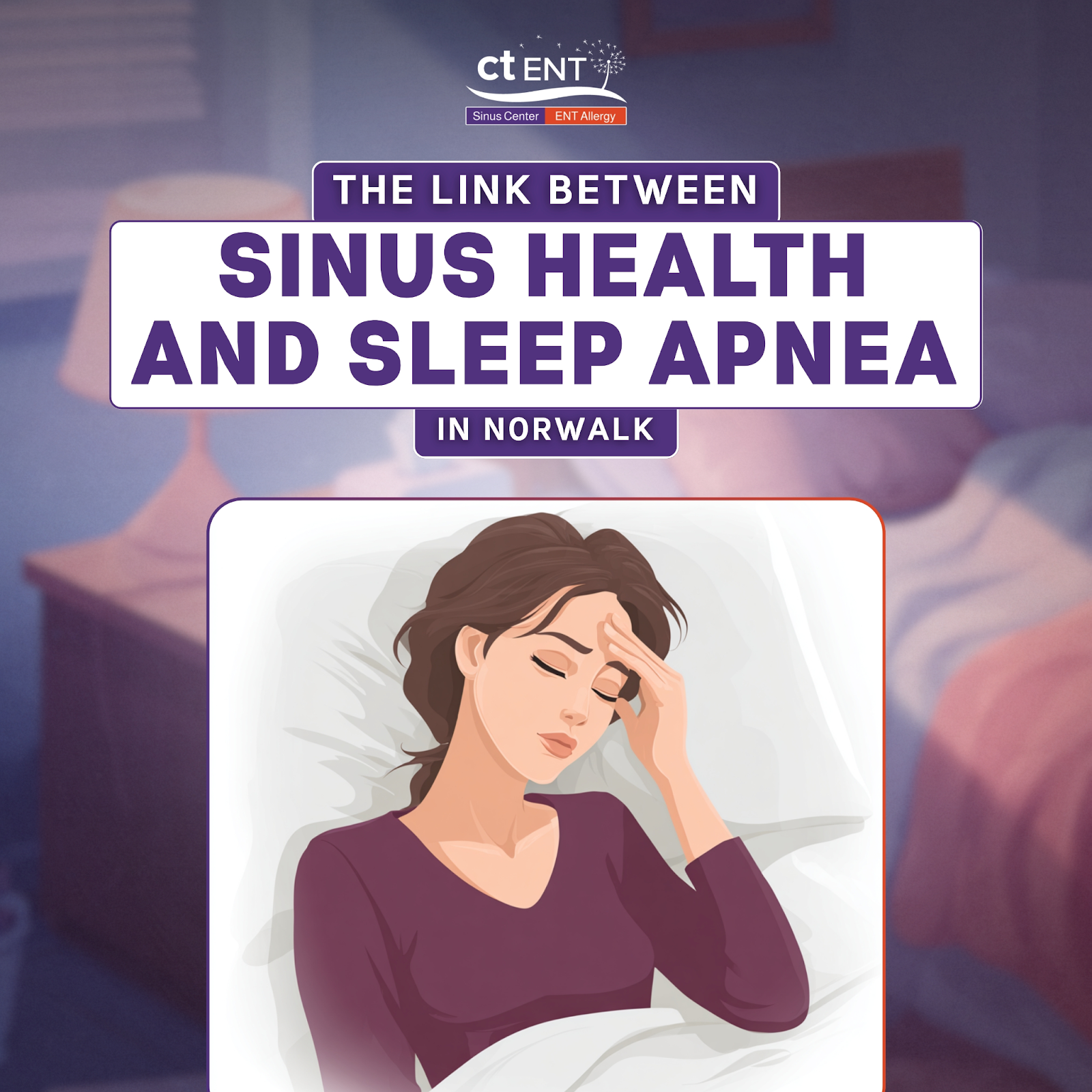.png)
The Link Between Sinus Health and Sleep Apnea in Norwalk
Everyone needs adequate sleep and rest. A good night’s sleep is essential to support overall health and well-being. Those who experience chronic sinus issues often find that these problems can significantly interfere with sleep quality.
Both sinus problems and sleep disruptions are common. If left untreated, they may contribute to long-term challenges with energy, concentration, mood, and overall physical health.
In this post, we’ll explore how sinus health and sleep apnea are connected — and what treatment options are available for residents of Norwalk and surrounding areas.

What Is Sleep Apnea?
Sleep apnea, commonly referred to as obstructive sleep apnea (OSA), is a sleep disorder marked by repeated interruptions in breathing during sleep. These episodes occur when the upper airway narrows or collapses, preventing airflow.
OSA is more common than many realize and affects millions of Americans — many of whom remain undiagnosed.
Common symptoms of OSA may include:
- Loud and frequent snoring
- Waking up gasping or choking
- Morning headaches
- Daytime fatigue or grogginess
- Difficulty concentrating
- Irritability or mood changes
Because OSA reduces oxygen levels and fragments sleep, it may increase the risk of:
- High blood pressure
- Heart disease
- Stroke
- Weight gain
- Type 2 diabetes
How Sinus Health and Issues Contribute to Sleep Apnea
Sinus problems can contribute to or worsen sleep apnea in several ways:
1. Sinus Inflammation and Swelling
Chronic sinus inflammation may extend beyond the nasal passages and affect the throat and upper airway. This can contribute to airway narrowing — a key component in OSA.
2. Chronic Nasal Congestion
Conditions such as sinusitis, nasal polyps, and allergies can block airflow through the nose. During sleep, this can worsen congestion, encourage mouth breathing, and increase snoring. In some cases, these factors may exacerbate sleep apnea symptoms.
3. Sleep Disruption from Sinus Symptoms
Nasal blockage, facial pressure, and postnasal drip can make it difficult to fall or stay asleep. These symptoms often lead to restless nights, shallow sleep, and frequent awakenings, contributing to daytime fatigue.
Together, sleep disturbance and sinus issues can create a cycle in which each condition worsens the other.
Treatment Options for Sinus Issues and Sleep Apnea
If sinus issues are affecting your sleep, several treatments may help address the underlying causes and support better rest:
✅ Medications
- Antihistamines may reduce inflammation from allergies.
- Decongestants can help relieve sinus pressure and improve drainage.
- Topical nasal steroids reduce swelling and promote airflow.
- Saline sprays help moisturize nasal passages and flush out irritant
✅ Advanced ENT Procedures
- Immunotherapy may be appropriate for patients with persistent allergic triggers, helping to desensitize the immune response.
- Balloon sinuplasty is a minimally invasive procedure that may improve airflow by gently opening blocked sinus passages.
- Septoplasty may be recommended if a deviated septum is restricting airflow and contributing to sleep and breathing issues.
✅ CPAP Therapy for Sleep Apnea
A CPAP (continuous positive airway pressure) machine is the most common treatment for moderate to severe OSA. It works by delivering steady air pressure through a mask, keeping the airway open during sleep. CPAP therapy can help reduce sleep disruptions and support more restful, restorative sleep.
Trust CT-ENT for Expert Sinus and Sleep Support in Norwalk
At CT-ENT, we understand how interconnected sinus function and sleep quality truly are. For patients in Norwalk and nearby communities, we offer comprehensive care to help identify the root causes of sleep disruptions — whether due to sinus conditions, sleep apnea, or both.
You don’t have to live with sleep difficulties caused by chronic sinus problems. Schedule a consultation with our team of sinus and sleep specialists in Norwalk to explore personalized treatment options that may help you breathe and rest more comfortably.

